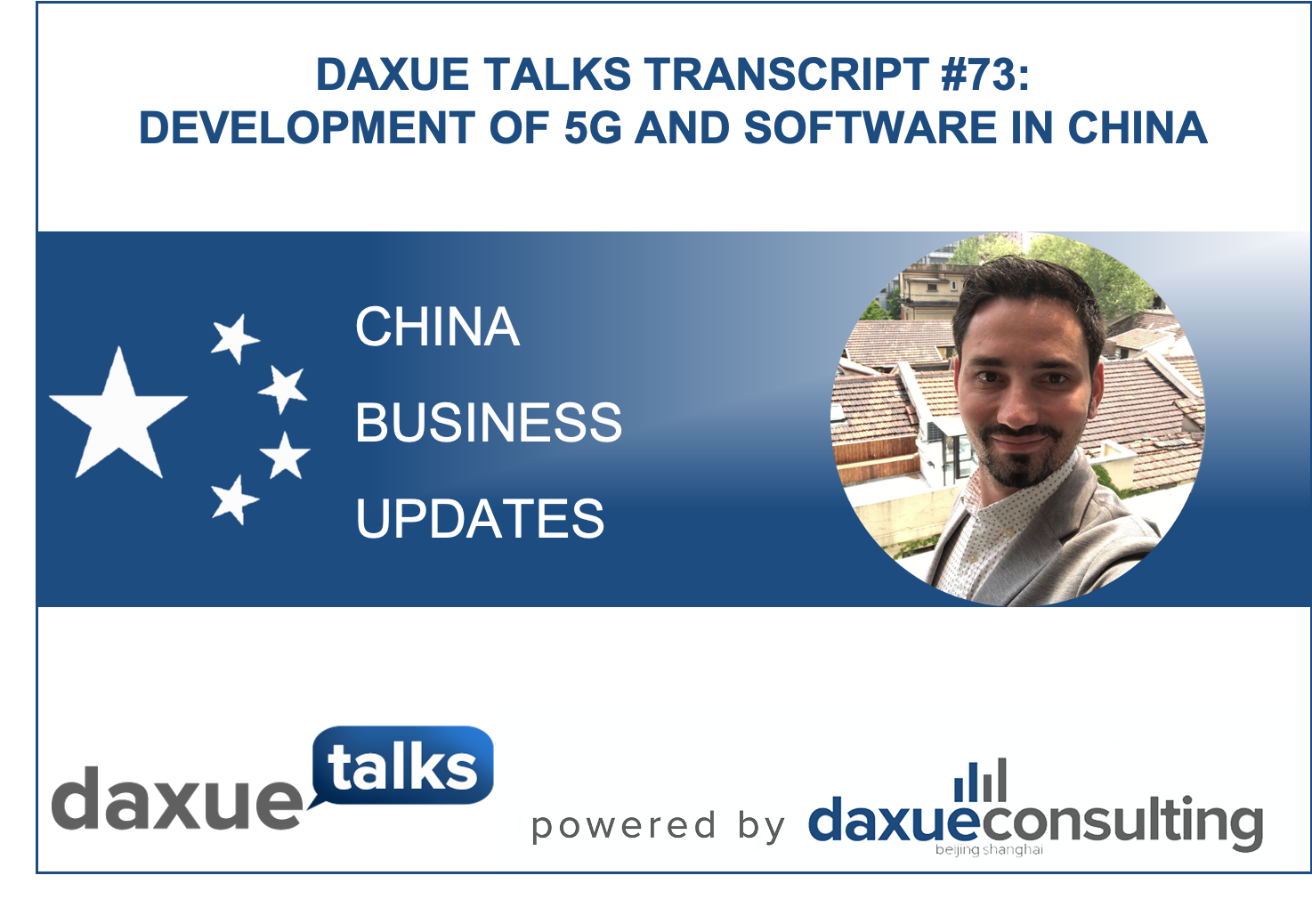Software in China
Find here Daxue Talks episode 73. Aurelien Rigart, Vice President and partner at IT Consultis, answers our questions regarding the development of the 5G in China and discusses the differences between developing software in China and in the rest of the world.
Full transcript below:
Hello everyone, I’m Aurelien Rigart I’m the co-founder and Vice President of IT Consultis, I’m from France. I’ve been in China and started this adventure nine years ago. So, IT Consultis is a digital transformation company. It’s a team of 80 people in three countries, which are China, Singapore, and Vietnam. So, we’re helping Fortune 500 and fast scaling start-ups to work on their digital transformation. It can range from eCommerce, from building mini-programs, from building websites, App, integrating systems together, or overall work as a consultant on their digital transformation initiatives.
Have clients ever asked you to develop on the Huawei OS?
So far – never. So far never which is interesting. I’m pretty sure that it’s going to happen at some point but I think this is like for very, very specific types of applications and I think marketers and brands they’re really focusing more on mini programs and on websites or trying to understand what is going to be the next mini program that will make sense – Douyin? Is Weibo? Is it Baidu? Because Baidu as well as Xiaomi has worked on mini programs. So, depending on the category that you’re working – but for us mainly working B2B or working with brands, our types of customers they never ask us for this.
How is the development of 5G so far in China? What do you expect as an impact of 2020?
Well I would say 5G is a birth word and clearly something that is going to revolutionize step by step the user experience but what’s important – so on top of the live stream you’re going to have more consumption of heavy files, video, 3D augmented reality, so that’s going to be the first step but when you’re talking as a brand – you still need to create those contents. So that means like from one day or another – live stream is one of the disruptions, but brands are not going to start creating millions of videos where they’re already struggling to catch the attention of the user. So, from a brand perspective, I think it’s going to have a very limited evolution. The live stream I think is a great evolution. In the future, you’re going to have AR where you’re going to have virtual shops and you’re going to have the opportunity to visit them. We have seen this in the past and it has shown that it is not bringing the highest conversion and that it was kind of gimmicky and gadgets – so are brands going to go in that direction? I don’t think so too much – I think the live stream is going to be something great, and then you’re going to potentially use more like AR – but it’s not going to touch too much about the 5G here. I think 5G is just going to enable like to download mini-program much faster, or to download apps much faster, but I think the 5G is going to have a stronger effect when you’re talking about IoT, maybe bitcoins, or just opportunity to download heavy files or when you’re on specific platforms when you want to for example mimic – if you’re doing the app for the NBA or maybe FIFA then you want to create a heavy content application where it’s going to be easy to display 4K videos and to promote some very specific content and this is where it’s going to have an influence.
What are the differences in developing software in China and the rest of the world? Are the languages of programming different?
So, overall, not that many differences. Of course, there are always cultural differences in terms of project management, integration, speed of development and weight management – but in terms of languages what we are seeing is that – we’re seeing a little bit of emergence of specific languages created by Chinese developer – view.gs, for instance, is a very strong JavaScript frontend that is competing against ReactJS or AngularJS – React that is created by Facebook and Angular – which is a framework that is created by Google. So I didn’t follow the market trends, but basically React, Angular – was started first but then React became the number one and Angular number two and I think View has such a strong community in China that he has emerged as potentially the number three – so I have to double-check what are the latest figures, but this is a language that is highly appreciated by the local developers and that has a pretty strong quality and is kind of interesting the way it’s been built in order to really leverage the WeChat – the different ecosystems and even the WeChat languages have kind of been used in order to create itself. So, I think there are very interesting things happening where we see the Chinese market is not just copying but innovating a very specific advanced technology where we have seen WeChat through the mini-program, creating their own languages and we see Alipay through the mini-program creating their own front end languages. So, I think it’s very interesting. So in terms of backend – those very backend heavy languages are kind of like very similar – wherever you’re looking at, and front end has been a little bit the changing component and I think that it’s something that is very interesting and sometimes you see that those languages are performing even better than the React or Angular that have been developed by a very strong community. Yet at the same time – when you’re going to talk with these Chinese developers – they’re going to say – oh I really prefer that languages or that language and we’ve seen as well some framework that have been created as well in China that have been like having a huge adoption, order management systems as well have been created, CRM have been created – so in terms of the backend language itself – not too much, but the framework that has been assembled around those languages – there’s a lot of really interesting ones – I know some frameworks are competing against like the Oracle framework, some frameworks for example like order management systems are competing against other order management systems here – even in terms of eCommerce – Adobe, Magento is a little bit being challenged – although what we see is that brands they still want to focus on having a strong quality – on our side we’re doing a lot of Magento development, Magento integration for brands and like when international brands are looking at very specific development, they’re going to have the importance of technology choice is going to be important, and if you’re working for example like with German companies – they will want to focus a lot of SAP and so on, so I think the technology inheritance from global to local is something that is important to have a look at, but in order to reply to your question – I would say that there is an emergence right now of Chinese languages and Chinese technology that should not be disregarded, that should be really looking into it and I think if global players like Salesforce, when they’re going to come in China in 1 year down the line – they want to establish a supremacy like they’re doing in the rest of the world. It’s not going to be that easy; they really need to take the extra step in order to make it happen.
Any questions? We will find an expert to answer them. Drop your questions in the comments, or send us an email at dx@daxueconsulting.com.





